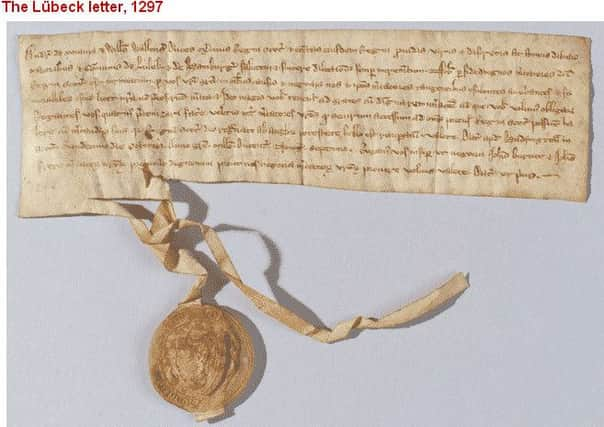How Lanark joined the EU 770 years before the U.K.


The Braveheart would have said a resounding ‘Yes’ to staying in.
The great Scottish hero’s voting intentions were revealed to local councillor and avid historian Ed Archer on the latest of his travellings abroad, mostly to world historical sites.
Advertisement
Hide AdAdvertisement
Hide AdYou would have thought that a place like Lubeck in Germany would be pretty free of any Scottish influence, never mind having any connection to Lanark or The Braveheart.
Nothing could be further from the truth, as Ed discovered.
Taking up the story, Ed says: “When I recently went on holiday to Northern Germany, I visited several towns there, one of which was Lubeck, which has a strong connection with Lanark’s great hero.
“In the City of Lubeck archives there is a letter which was written on behalf of William Wallace and his ally Andrew de Moray and addressed to the cities of Hamburg and Lubeck.
“It was, in effect, a message to Germany that Scotland was ‘open for business’ when it came to trading with the Continent, having just recently freed itself from English occupation.”
Advertisement
Hide AdAdvertisement
Hide AdHe revealed that the reason for writing to these two German cities was that they were, in effect, the Brussels and Strasbourg of their day, ie; centres of what was, in effect, a 13th century European Union!
Explained Ed: “Both these cities were, at the time, prominent members of a major trading organisation called The Hansa.
“This group, called more properly The Hanseatic League, was an association of cities along the coasts of the North Sea and the Baltic, stretching from Bergen in Norway, round the Baltic Sea, down as far as Bruges in Belgium.
“It was, very much, the mediaeval equivalent of the EU.”
He explained that the Lubeck Connection to Scotland went far further than Wallace’s letter; in fact, Scottish accents would not have been unfamiliar to the ears of the citizens of Lubeck and the rest of Baltic area at that time.
Advertisement
Hide AdAdvertisement
Hide AdHe said: “Cities like Lubeck gave the Scottish merchants access to goods bought from Southern Europe, Russia and the Middle East and even from the north of Africa.
“To pay for these goods, Scotland exported wool and grain to Europe.”
Ed, a leading light in the Lanark and District Archaeological Society, said that evidence of the early Euro-trade can be found right here in Clydesdale.
“Archaeological investigations made in Clydesdale over the years have resulted in finds of items from 14th century Europe – coins from Flanders, now part of modern Belgium, pottery from Germany and France and even glass from Syria!”
Advertisement
Hide AdAdvertisement
Hide AdHe said there was another fascinating possible Lanark/Lubeck link.
“One thing that Lanarkians visiting Lubeck will notice and find strangely familiar is the double-headed eagle on the city coat-of-arms.
“It is very similar indeed to our Burgh coat of arms. Perhaps, there should be a European Wallace Exchange between Germany and Scotland to commemorate over 700 years of being trading partners?”